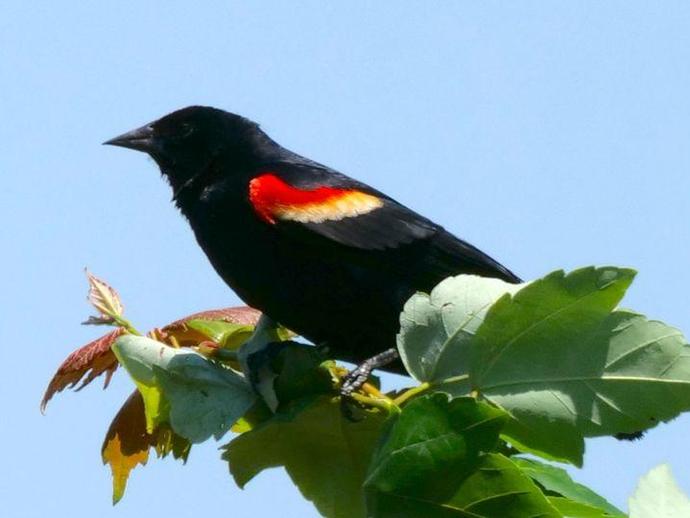May 10, 2021
It's time for today's edition of #BenInNature presented by our friends at Carter Bank & Trust!
Last week, I went on a trip to South Carolina that included a detour to a couple of amazing nature parks in Augusta, Georgia. Over the next week or so, I'll be sharing some of my favorite critters that I spotted, many of which can be found in Virginia, a few of which can only be found a little farther south.
We'll kick things off with a bird that I've seen in Martinsville and Henry County in years past: Agelaius phoeniceus, the red-winged blackbird!
The red-winged blackbird is one of my favorite birds, and I used to see them frequently in a swampy area off of King's Mountain Road in Martinsville, although it's been awhile since I last saw one there (note: this may have more to do with the quality of my birding skills than the prevalence of the birds). While the females are a dull brown color, the males are black with vibrant red and yellow bars on their shoulders. These birds can be found year-round through most of North America, and they generally prefer to live in or near wetlands and swamps. I spotted this one at Phinizy Swamp Nature Park in Augusta, Georgia.
Male red-winged blackbirds are highly territorial, and their shoulder bars play a big role in their territory defense. Males with bigger shoulder spots are more effective at chasing away rival males. In fact, an experiment was conducted in which the bars of multiple males were dyed black, and 64 percent of those males lost their territories!
Not only do the males defend their territory, they also play the field, so to speak. A single male will have multiple female mates, as many as 15 in some cases! However, studies have shown that when these females lay their eggs, between a quarter and half of the nestlings were actually sired by different male red-winged blackbirds. Clearly, the red-winged blackbird would be a great candidate for an episode of Maury.
ABOUT #BenInNature
Social distancing can be difficult, but it presents a great opportunity to become reacquainted with nature. In this series of posts, Administrator of Science Ben Williams ventures outdoors to record a snapshot of the unique sights that can be found in the natural world. New updates are posted Monday - Friday, with previous posts highlighted on the weekends. This series of posts is made possible thanks to the support of VMNH Corporate Partner Carter Bank & Trust (www.cbtcares.com).
NATURE PHOTO IDENTIFICATIONS
If you discover something in nature that you would like help identifying, be sure to message us right here on Facebook with a picture (please include location and date of picture) and we'll have our experts help you identify it!

 Hours & Admissions
Hours & Admissions Directions
Directions

